Waiting for justice
"But far more important than any of these is that society as a whole believes passionately that every human being deserves to be treated justly, that when one human being is manifestly denied justice, then we are in real danger of being denied it." "And justice cannot be done hastily. And justice cannot be done in the dark." "It has to be done with due deliberation, in full view of the people in whose name it is done. For it is done for them." - Tun Salleh Abas, Former Chief Justice and Lord
President of Malaysia (from the book with K Das, ‘May Day For Justice’)
I arrived at just before 7 a.m. - the High Court building was still cloaked in the velvet darkness of the early morning and the traffic was light. A sign at the iron gate underneath the porte-cochere entrance porch stated "PP LWN DATO’ SERI ANWAR IBRAHIM - Cuma peguam yang ada dalam rekod mahkamah sebagai peguam mewakili Dato’ Seri Anwar Ibrahim diberi keutamaan masuk. Arahan YAA".("Public Prosecutor vs Dato’ Seri Anwar Ibrahim - Only lawyers in the court records as being representatives of Dato’ Seri Anwar Ibrahim are allowed to enter") In front of the iron gate, even at that ungodly hour (for me anyway!) there was already a queue of at least fifty people standing in line at the entrance. My heart sank. It was a mixed group of anxious watchers of justice. There were old and young. Immediately in front of me was an elderly Indian pensioner, behind me was a young Malay office worker. A well-dressed middle-aged gentleman with an attaché case checked the latest stock market reports from his morning papers. Immediately behind him was a young student wearing a National University of Malaysia Medical Faculty t-shirt, talking to an elderly Malay gentleman wearing a faded batik shirt and clutching a plastic container of cocoa. There were a few foreigners in dark suits clutching APEC conference bags and, further behind me, a group of young lawyers poring through their client briefs.
The trial proper was only going to start at 9.00. Some people killed time by reading the papers, probably catching up with developments in court yesterday. One poor chap in the queue was reading Thursday’s copy of Utusan Malaysia and another person behind him started haranguing him about how the paper was "penabur fitnah" ("spreader of lies") and urging him to stop buying it. The poor chap pleaded innocence by saying he only bought it on Thursdays for its computer pull-out feature.
My little group started discussing the reasons why they were here. Some of them were here for the first time, others were relative ‘veterans’. "I’ve been here almost every day since the trial began," said the Malay gentleman in the faded batik shirt. "Sometimes I managed to get in, but most times I can’t. I’m just here to show my support for Brother Anwar. Even if I can’t get in, at least, I’m here in the queue." He then went on to talk about the demonstrations. "I thinks the demos were good. They showed Mahathir that people are angry with what he had done. But the police were rough with us and it frightened a lot of people. ‘They’ had to use violence and fear to silence the people. That is not a sign of good government," he lamented.
There were hoots of approval from those around us. "Why don’t they consider this an illegal assembly?" somebody asked. The Indian pensioner in front of me volunteered another idea. "They should broadcast the trial on TV. Let all Malaysians see justice being done. Why don’t they? Do they have something to hide?" The office worker behind me even suggested holding the trial at the convention hall of Kuala Lumpur’s Putra World Trade Centre. "They can even charge if they wanted! Thousands will still come. We can donate proceeds to the ‘Save The Nation Fund’ - no need for them to steal our EPF pension money!" To peals of laughter, the office worker suggested the money be used to buy even more designer clothes for Ummi Hafilda. "She’s sure to run out of outfits before the hearings end!" he quipped.
A young, attractive Punjabi lawyer behind us started criticising the defence team’s strategy. "The defence team only has to show that there is no physical evidence proving the alleged corruption took place and discredit the evidence in the form of testimony from the witnesses. So far they have only focused on discrediting the testimony and going on and on about this conspiracy theory. They should have challenged the first witness to produce evidence of written instructions or proof of meetings - but they didn’t. They missed a golden chance there." Someone else remarked that the Anwar team probably wanted to highlight the bigger picture of political conspiracy to the public. The young lawyer disagreed. "They should just focus on proving Anwar innocent. We can worry about the politics once he’s out of jail."
The lady admitted she was very confused by everything that was happening. "I don’t know if he is guilty or innocent. But even if he is guilty, I don’t understand why they are treating him like this. Our leaders are coming out with so much filth in the papers. It shames his family and it shames our race." She turned to the Indian pensioner. "We Malays don’t usually treat people like this. ‘Maruah’ (Dignity) is very important to us. Even the guilty deserve dignity. It’s in our ancient annals, the Sejarah Melayu. But our leaders don’t seem to understand this. This is not the Malay way. That is why so many of us are angry." A Chinese gentlemen interjected. "I believe Anwar is innocent - until the court proves otherwise. That is the basis of justice and rule of law - a man is innocent until proven guilty by a court of law. But look at that ...". He pointed to the headline of a local English daily that morning. "They’ve already found him guilty. What’s the use of us queuing here for hours waiting for justice?" I liked his phrase. Waiting for justice. I made a mental note to use it as the title for my next article. By then, it was already 8:30. The rush hour traffic was busier now, with hundreds of curious drivers and bus passengers gawking at our ever-increasing line of people. It was as though there were looking at some terrible road accident or a dying road casualty. And perhaps there were those who felt that justice was indeed a casualty here. There was a small stir when we spotted someone crossing the road towards the court building. It was the Special Rapporteur on Judicial Independence for the United Nations Commission on Human Rights, Param Cumaraswamy. There was an even bigger stir when we spotted him storming out of the building, looking rather annoyed. I asked a reporter friend of mine who was hovering nearby what had happened. "They wouldn’t let him into court," he said. "The United Nations appoints this one man - a Malaysian - as their sole representative in ensuring the independence of legal institutions worldwide, he sits in court houses in Cambodia, El Salvador, Haiti and Rwanda - and they won’t even let him enter a court in his own country. Ironic isn’t it?" I stopped myself from letting out a cheer of "Malaysia Boleh!"("Malaysia Can!"). It wouldn’t have seemed appropriate in front of a foreign journalist.
It seems as though the father is not the only one to be sentenced.
Someone brought up the subject of demos during APEC and offered some tips. "Next time you go ‘shopping’ in Jalan TAR, make sure you actually buy something and keep the shopping bag and receipt with the date on it. It’d be easier to prove in court you were there just to shop!" With all the heated discussions, we hadn’t realised it was nearly 9:00 - until someone spotted the now-famous leading defence lawyer Christopher Fernando walk by. The little clumps of discussion groups now quickly formed back into a neat straight line, all of craning our necks towards the front to see if they were letting people in yet. In a few moments, the gates were indeed opened - but only a handful of five or six people managed to gain entry. There was a loud groan from the crowd as a small, handwritten was tied to the gate - "HARAP MAAF - SUDAH PENUH" (APOLOGIES - FULL)
I had a chat with one local journalist, who assured me that she and her team did their best to remain impartial in their coverage of the trial. "For example, we try not to mention his name - we always refer to him as ‘the accused’. And we avoid words that imply either guilt or innocence - we make sure that statements are either ‘claimed’ or ‘alleged’," she claimed. "And we certainly won’t come out with headlines like that," she remarked, pointing at the front page of a local English broadsheet. But she admitted that her stories did get ‘changed’.
A long column of FRU were already deployed along the road and they started moving people away from the front of the entrance. The crowd was dispersed to further down the road - up to a point where Anwar probably wouldn’t be able see them when he was driven off. "Do you have any business in the court?" they asked individuals gathered there. "If not, please go ..."
As the blue Pajero sped off towards Independence Square, the crowd of demonstrators continued shouting and cheering, with the long row of FRU officers just glaring angrily at them from the opposite bank. It was a dramatic end to what was, up to then, a pretty quiet morning. I had spent at least two hours of the early part of the morning queuing up for justice, along with at least a hundred other people. Except for a handful of us, it was futile. We all knew it was futile, but we stayed and, in the process, we learnt from each other a little about that precious justice that we were all waiting for. And we showed others why we were there. "... society as a whole (must believe) passionately that every human being deserves to be treated justly, that when one human being is manifestly denied justice, then we are in real danger of being denied it." "And justice cannot be done hastily. And justice cannot be done in the dark." "It has to be done with due deliberation, in full view of the people in whose name it is done. For it is done for them."
|
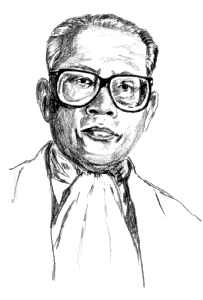 "...my
pleas, as we all know, fell on deaf ears....in the end, justice is not
done because you have a better pleader or a better judge. Justice is not
even done because you have better laws. These things are undoubtedly important."
"...my
pleas, as we all know, fell on deaf ears....in the end, justice is not
done because you have a better pleader or a better judge. Justice is not
even done because you have better laws. These things are undoubtedly important."
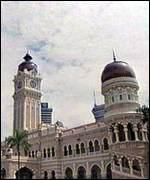 The
historic heart of modern Malaysia is perhaps Dataran Merdeka - Independence
Square. On its hallowed ground, at the stroke of midnight, on August 31st,
forty one years ago, the flag of a new nation was raised here - a nation
that could elect its own law makers and make its own laws. Looking down
on this field, atop a hill, like an omnipotent sentinel, is Bukit Aman
- The Hill of Peace - on which sits the headquarters of the Royal Malaysian
Police - the institution that enforces those laws. And
skirting the opposite side of the Independence Square are the Moghul-style
buildings that house the institutions that mete out justice according to
those laws - our courts of law. Among them is the Federal High Court building,
right in the centre facing Independence Square, and today, the centre of
the country’s most historic trial.
The
historic heart of modern Malaysia is perhaps Dataran Merdeka - Independence
Square. On its hallowed ground, at the stroke of midnight, on August 31st,
forty one years ago, the flag of a new nation was raised here - a nation
that could elect its own law makers and make its own laws. Looking down
on this field, atop a hill, like an omnipotent sentinel, is Bukit Aman
- The Hill of Peace - on which sits the headquarters of the Royal Malaysian
Police - the institution that enforces those laws. And
skirting the opposite side of the Independence Square are the Moghul-style
buildings that house the institutions that mete out justice according to
those laws - our courts of law. Among them is the Federal High Court building,
right in the centre facing Independence Square, and today, the centre of
the country’s most historic trial.  Friday,
November the 13th, 1998, was to be the last day of the trial of ousted
deputy premier Anwar Ibrahim on four charges of corruption - before the
courts took a break for the upcoming APEC meeting in Kuala Lumpur. For
days since the trial had begun on November 2, hundreds had thronged the
courts to be part of Malaysia’s Trial of the Century. That day, I wanted
to be one of them.
Friday,
November the 13th, 1998, was to be the last day of the trial of ousted
deputy premier Anwar Ibrahim on four charges of corruption - before the
courts took a break for the upcoming APEC meeting in Kuala Lumpur. For
days since the trial had begun on November 2, hundreds had thronged the
courts to be part of Malaysia’s Trial of the Century. That day, I wanted
to be one of them. 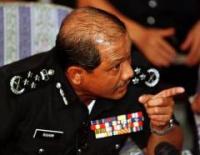 A
small group of journalists - foreign and local - were loitering under the
porch, including a TV crew from, of all places, the Republic of China.
I managed to say a quick "Hi!" to John Sweeney as he walked past
us on his way to the rear entrance where the registered press were allowed
to enter. Sweeney was the Observer journalist who wrote that famous story
of the press conference where the Inspector General of Police, after a
few difficult questions, told him to "shut up" and threateningly
ordered Sweeney to "come to my room". I wondered if they had
reserved a special room for John in the court as well.
A
small group of journalists - foreign and local - were loitering under the
porch, including a TV crew from, of all places, the Republic of China.
I managed to say a quick "Hi!" to John Sweeney as he walked past
us on his way to the rear entrance where the registered press were allowed
to enter. Sweeney was the Observer journalist who wrote that famous story
of the press conference where the Inspector General of Police, after a
few difficult questions, told him to "shut up" and threateningly
ordered Sweeney to "come to my room". I wondered if they had
reserved a special room for John in the court as well. 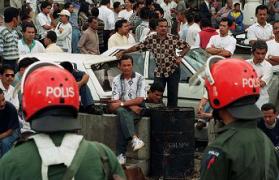 At
7:30, the FRU trucks started arriving and the riot police started filing
out - groups of three red-helmeted FRU officers stationed about twenty
paces apart along the whole perimeter of Dataran Merdeka and the High Court
building. The heavy police presence took me back to the night of October
10th when, under that very same porch, senior police officers and demonstrators
had heated negotiations trying to settle a standoff between water cannon
and 5,000 demonstrators. So much history, in such a short space of time,
in that one place.
At
7:30, the FRU trucks started arriving and the riot police started filing
out - groups of three red-helmeted FRU officers stationed about twenty
paces apart along the whole perimeter of Dataran Merdeka and the High Court
building. The heavy police presence took me back to the night of October
10th when, under that very same porch, senior police officers and demonstrators
had heated negotiations trying to settle a standoff between water cannon
and 5,000 demonstrators. So much history, in such a short space of time,
in that one place. 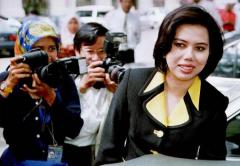 But
most people just stood around bored - and eventually talked with people
around them. Pretty soon, little discussion groups started forming along
the length of the queue, debating everything from the independence of the
judiciary to the colourful wardrobe of Ummi Hafilda, the star witness of
the prosecution.
But
most people just stood around bored - and eventually talked with people
around them. Pretty soon, little discussion groups started forming along
the length of the queue, debating everything from the independence of the
judiciary to the colourful wardrobe of Ummi Hafilda, the star witness of
the prosecution.  He
then proposed a novel idea. "I’ve been standing in this queue for
almost two weeks now, along with hundreds of other people. The police don’t
bother us because the courts say we can wait to go in, to see justice done.
Why don’t those thousands of demonstrators join us one morning? We can
have a line with thousands of people, with a queue that will stretch across
to the National Mosque even." He pointed to Bukit Aman Police Headquarters.
"That will show ‘them’ on top of the hill that we all only want justice
- nothing else."
He
then proposed a novel idea. "I’ve been standing in this queue for
almost two weeks now, along with hundreds of other people. The police don’t
bother us because the courts say we can wait to go in, to see justice done.
Why don’t those thousands of demonstrators join us one morning? We can
have a line with thousands of people, with a queue that will stretch across
to the National Mosque even." He pointed to Bukit Aman Police Headquarters.
"That will show ‘them’ on top of the hill that we all only want justice
- nothing else." 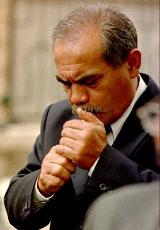 He
added that he was here to see for himself what was happening. "I don’t
believe what I read in the papers. They just highlight what the government
wants them to highlight. I read on the international news websites that
the Special Branch chief admits he may lie in court if Mahathir tellsd
him to. But the local papers report the he believes the sex charges - no
mention about him lying or not lying in court. How can we believe them?"
He
added that he was here to see for himself what was happening. "I don’t
believe what I read in the papers. They just highlight what the government
wants them to highlight. I read on the international news websites that
the Special Branch chief admits he may lie in court if Mahathir tellsd
him to. But the local papers report the he believes the sex charges - no
mention about him lying or not lying in court. How can we believe them?"
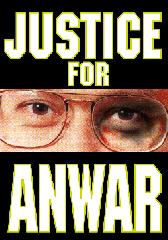 An
elderly Malay lady said she came to court to look into Anwar’s eyes. "I
can tell if someone is innocent or guilty just by looking into the person’s
eyes!" she boasted. The Malay gentleman behind her quipped, "Maybe
you should teach the judge how to do that - it would save everyone a lot
of trouble!"
An
elderly Malay lady said she came to court to look into Anwar’s eyes. "I
can tell if someone is innocent or guilty just by looking into the person’s
eyes!" she boasted. The Malay gentleman behind her quipped, "Maybe
you should teach the judge how to do that - it would save everyone a lot
of trouble!" 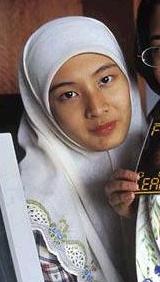 This
journalist also excitedly told my little group about his last interview
- with Nurul Izzah, Anwar’s daughter. While she had taken a few days off
from university classes to see her father in prison, a government official
had apparently given a ‘talk’ to the other students about ‘current political
developments’ and forbade people from talking to her. Nurul Izzah returned
to university finding a stony silence from everyone. She became so miserable,
her mother took her back home and she was forced to take a semester’s leave
from classes.
This
journalist also excitedly told my little group about his last interview
- with Nurul Izzah, Anwar’s daughter. While she had taken a few days off
from university classes to see her father in prison, a government official
had apparently given a ‘talk’ to the other students about ‘current political
developments’ and forbade people from talking to her. Nurul Izzah returned
to university finding a stony silence from everyone. She became so miserable,
her mother took her back home and she was forced to take a semester’s leave
from classes. 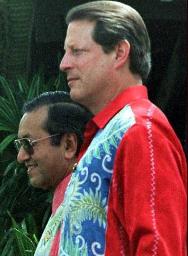 The
discussions around our little group turned to APEC - the office worker
was wondering why the trial had to be adjourned during APEC. There was
general consensus that there would be disruption - though we couldn’t agree
if the trial would disrupt APEC discussions or if the APEC members would
disrupt trial deliberations. "The sight of US President Bill Clinton
and Philippine President Joseph Estrada queuing up behind us in front of
the court building might look rather embarrassing for the government, "
I noted.
The
discussions around our little group turned to APEC - the office worker
was wondering why the trial had to be adjourned during APEC. There was
general consensus that there would be disruption - though we couldn’t agree
if the trial would disrupt APEC discussions or if the APEC members would
disrupt trial deliberations. "The sight of US President Bill Clinton
and Philippine President Joseph Estrada queuing up behind us in front of
the court building might look rather embarrassing for the government, "
I noted. 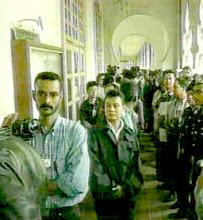 Not
wanting the morning to be a complete waste, I decided to hang around the
porch area with some of my journalist buddies - and found that hanging
around outside the court was probably as informative as being inside it.
It was fortunate that a lot of the defence team were smokers. Every time
one of them left the courtroom for a cigarette break, they would be swarmed
by reporters from the other side of the corridor grill - and you would
get pretty frequent, up-to-the-minute blow-by-blow descriptions of what
was happening inside.
Not
wanting the morning to be a complete waste, I decided to hang around the
porch area with some of my journalist buddies - and found that hanging
around outside the court was probably as informative as being inside it.
It was fortunate that a lot of the defence team were smokers. Every time
one of them left the courtroom for a cigarette break, they would be swarmed
by reporters from the other side of the corridor grill - and you would
get pretty frequent, up-to-the-minute blow-by-blow descriptions of what
was happening inside. 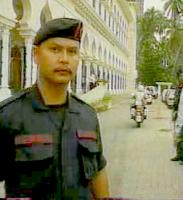 It
was nearing noon and I decided to go to the rear entrance of the court
building to catch sight of the ‘accused’ leaving. A small group of on-lookers
had gathered there, by the banks of the river, and speculation was rife
as to why it was taking them so long to leave - the court was supposed
to adjourn at 11:30 and it was already past 12. Someone remarked that they
were going to be late for Friday prayers if they didn’t hurry up and someone
else wondered if they would take Anwar to the Jamek mosque nearby, since
it was already late. "I hope they don’t take him to the Jamek mosque,"
he added, "They’ll probably make us queue to get in there as well!"
It
was nearing noon and I decided to go to the rear entrance of the court
building to catch sight of the ‘accused’ leaving. A small group of on-lookers
had gathered there, by the banks of the river, and speculation was rife
as to why it was taking them so long to leave - the court was supposed
to adjourn at 11:30 and it was already past 12. Someone remarked that they
were going to be late for Friday prayers if they didn’t hurry up and someone
else wondered if they would take Anwar to the Jamek mosque nearby, since
it was already late. "I hope they don’t take him to the Jamek mosque,"
he added, "They’ll probably make us queue to get in there as well!"
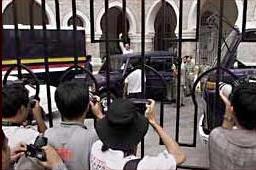 Funnily,
the officers ignored me - everyone else was asked to go. They didn’t even
come up to me when they were checking the press photographer’s press tags.
This was probably because I was dressed like a lawyer - I had put on my
best white shirt and dark jacket, and had a clutch of borrowed law books
in my arm! Particularly prominently displayed was my copy of the ‘Prevention
of Corruption Act 1961 (Act 57) & Emergency (Essential Powers) ordinance
No. 22 1970’! For a few moments, I cut a lone figure among the press photographers
and policemen at the front entrance. I was even more nervous when there
were suddenly a great number of very tough-looking, muscular ‘civilians’
around me - and the police didn’t seem bothered about dispersing them!
Funnily,
the officers ignored me - everyone else was asked to go. They didn’t even
come up to me when they were checking the press photographer’s press tags.
This was probably because I was dressed like a lawyer - I had put on my
best white shirt and dark jacket, and had a clutch of borrowed law books
in my arm! Particularly prominently displayed was my copy of the ‘Prevention
of Corruption Act 1961 (Act 57) & Emergency (Essential Powers) ordinance
No. 22 1970’! For a few moments, I cut a lone figure among the press photographers
and policemen at the front entrance. I was even more nervous when there
were suddenly a great number of very tough-looking, muscular ‘civilians’
around me - and the police didn’t seem bothered about dispersing them!
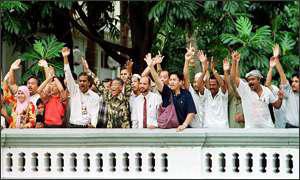 Soon
after, the ‘accused’ appeared - and was whisked into a dark blue Pajero.
At that precise moment, there was a loud road roar of "Allahuakbar!",
followed by an even louder shout of "Reformasi!". The
cheers did not come from my little group of on-lookers but from a crowd
of about a few hundred people who had gathered, unnoticed, in the Jamek
mosque across the river.
Soon
after, the ‘accused’ appeared - and was whisked into a dark blue Pajero.
At that precise moment, there was a loud road roar of "Allahuakbar!",
followed by an even louder shout of "Reformasi!". The
cheers did not come from my little group of on-lookers but from a crowd
of about a few hundred people who had gathered, unnoticed, in the Jamek
mosque across the river.